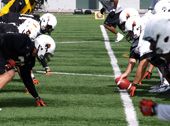
What's in the new Minnesota sports gambling proposal? Here are 5 key elements
A brand-new bill that would legalize sports gambling in Minnesota is officially on the table — and has support from both DFL and Republicans lawmakers.
Reps. Pat Garofalo (R-Farmington) and Zack Stephenson (DFL-Coon Rapids) revealed a much-discussed lawful sports betting bill Monday. The proposal would allow adults in Minnesota to legally bet on sports, while setting out the regulations and restrictions that would come with it.
“State lawmakers in the Minnesota House have crafted a thoughtful bill based on respectful consultation with sovereign tribal nations, professional sports teams, experts in problem gaming, and many other stakeholders," said Stephenson in a statement. "This is the year we get sports betting done in Minnesota.”
Said Garofalo: “A majority of states have abandoned the underground market and instead chosen a legalized sports gambling marketplace. It is time for Minnesota to do the same."
The bill was sent to the Commerce Finance and Policy Committee, with a hearing set for Tuesday afternoon. There is not currently a companion bill in the Minnesota Senate, though there is a differing proposal.
Minnesota is the only state in the upper Midwest at this point not to have legalized sports gambling. North Dakota, South Dakota, Wisconsin, Iowa and Illinois all allow it.
What's in the legislation? Here are five key elements.
- In-person or online betting
Under the bill, adults (meaning age 18 and up) could wager on sports games either in-person at a brick-and-mortar location (such as a casino), or through a mobile app or website. Anyone who places a bet through an app or website has to physically be in the state of Minnesota at the time.
- Native American tribes would oversee it
Only Native American tribes in Minnesota would be allowed to offer sports betting at casinos or operate mobile sports gambling apps. (As the Minnesota Reformer notes, this means horse tracks would be left out.)
The bill language specifies in-person legal bets can only be made at casinos run by any of the state's 11 recognized tribes. For online wagering, the state will issue two 20-year "master mobile sports betting licenses" — one to tribal entities north of I-94, one to tribal entities south of the interstate.
- It's not a revenue generator
Many proponents of legalized sports gambling have touted the estimated $40 million a year in new tax revenue it could spur. Garofalo and Stephenson, in Monday's media release, say explicitly: "The legislation is not meant to be a revenue driver for the state."
- Where the money would go
The bill would institute a tax (amount TBD) on online wagers, but that revenue would go to specific fund. It would then be doled out as follows:
- 50% would go to the Minnesota Amateur Sports Commission, which would have to use most of that money to facilitate youth sports programs in high-crime areas.
- 40% would be diverted to the commissioner of human services for gambling treatment programs.
- The remaining 10% would go to the Department of Public's Safety to pay for enforcement of gambling crimes.
- Misdemeanors to felonies
Gambling violations, as laid out in the current bill, could range from misdemeanors for small offenses, all the way up to felonies for egregious, repeated violations. Both people placing bets and gambling operators could be prosecuted.